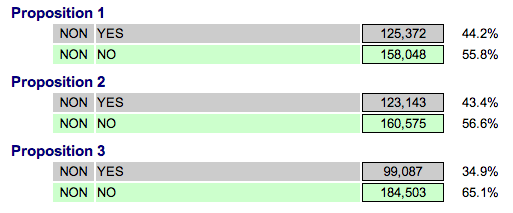Fate of Idaho Education Ballot Measures Uncertain
In Idaho, voters are deciding whether to uphold a suite of controversial and far-reaching measures passed by the state legislature last year, pushed by divisive state Superintendent Tom Luna and signed by Gov. C.L. “Butch” Otter. As of 2 a.m. EST Wednesday morning, 382 of 967 precincts have reported. There are three individual measures presented to voters, who were asked to vote “Yes” to uphold them and “No” to repeal. Currently, the early results show all three propositions being repealed.
 Results as of 2 a.m. EST, with 382 of 967 precincts reporting. Source: Idaho Office of the Secretary of State
Results as of 2 a.m. EST, with 382 of 967 precincts reporting. Source: Idaho Office of the Secretary of State
- Proposition 1 would limit teachers’ collective bargaining rights by giving expanded authority to local school boards and phase out tenure, forcing teachers to work on one- to two-year contracts. It would also make 50 percent of teacher evaluations tied to student academic performance, and involve parents in evaluations. Yes for Education, a group supporting affirmation of the measures, say the measure gives control of education to local communities, while detractors warn that the voice of those in the classroom will be weakened.
- Proposition 2, if approved, will establish a $38 million performance-based pay system for teachers, making them eligible for up to $8,000 in bonuses per year. Bonuses will be awarded to teachers who agree to work in hard-to-staff districts and on academic performance metrics like state median state assessment scores and growth, and meeting Adequate Yearly Progress. Opponents are concerned it will unfairly magnify the importance of standardized test scores.
- Proposition 3, if passed, would be one of the most significant statewide online learning measures passed by voters. It would give every high school teacher and student a laptop and sets aside an additional $9 million for technology in elementary and middle schools. Students would be required to earn two credits through online or blended learning courses in order to graduate. Vote NO on Propositions 1, 2, and 3 claim the measure would divert taxpayer dollars to technology corporations and marginalize teachers.
That last argument against Proposition 3 played out in more than just rhetorical circles, spilling into courts. A group supporting these measures and spending considerable dollars on supportive advertising, Education Voters of Idaho, was forced to disclose its donors after a lawsuit from Idaho Secretary of State Ben Ysursa. The group had argued its donors could be hidden because it is registered as a 501(c)4. Surprisingly, those donations included $200,000 from New York City Mayor Michael Bloomberg, and $200,000 from Joe Scott, an heir to Albertsons, a grocery store chain.
More than $6 million combined was donated to both sides of the debate, unprecedented for ballot initiatives in that state.
Idaho leans heavily Republican but a repeal of the measures would proves the non-partisan nature of many debates on reshaping education. Tonight, in Indiana, we already saw Democrat Glenda Ritz defeat incumbent state superintendent Tony Bennett in a conservative-leaning state. In a recent New York Times piece, Gov. Otter offered support for Chicago Mayor Rahn Emanuel during the teachers’ strike there. The measures originate from Idaho’s Race to the Top application.
In the days leading up to Nov. 6, it was revealed a wealthy Idaho businessman had moved his donation from Yes for Education to Educators for Idaho in August, in order for it to be concealed. Luna also announced an eight-year, $180 million contract with Hewlett-Packard to provide laptops if the online learning measure is upheld.
